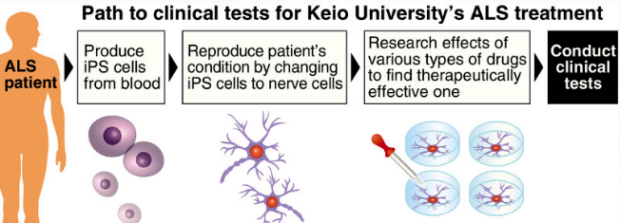TOKYO – A Keio University research team will begin clinical tests for the treatment of amyotrophic lateral sclerosis (ALS), administering ALS patients an existing drug used for another disease, which is confirmed to be effective in experiments with induced pluripotent stem (iPS) cells.
The researchers conducted experiments using iPS cells created from the cells of people with ALS. Existing drugs were used on the iPS cells and researchers found that a drug to treat Parkinson’s disease was effective for treating ALS.
With the use of an existing drug, the expectation is that the treatment can be prompt, the researchers said.
Planned clinical tests will be conducted on 20 people aged 20 to 80 who have developed ALS in the last five years, with the recruiting of patients starting Monday. In the clinical tests, researchers plan to confirm the safety and efficacy of the drug over a period of 18 months.
As there are few pharmaceutical options in current treatment methods, drugs to slow the progression of the disease have mainly been used for ALS, a disease that destroys nerve cells that control voluntary muscle movement.
The research group led by Hideyuki Okano, a Keio professor who specializes in physiology, produced iPS cells from ALS patients for whom the disease has run in their family.
The researchers then reproduced ALS conditions after changing the iPS cells into nerve cells. Researchers used 1,232 kinds of existing drugs on these iPS cells.
The results confirmed that ropinirole hydrochloride, which is used for Parkinson’s disease, was effective in suppressing the death of nerve cells.
Researchers then conducted the same experiment on the iPS cells from 22 ALS patients who do not have any family history of ALS. The drug was effective for 16 of these 22 patients.
The drug was two to three times more effective than existing drugs for ALS treatments, Okano said.
“We hope that the clinical test will be successful to suppress progression of symptoms so that body functions remain, even if only a little,” said Shigeyuki Shimamori, chairman of the Japan Amyotrophic Lateral Sclerosis Association.
